#But I do love Michael Sheen. He makes a lovely Aziraphale.
Note
do you have any fic recs for aziracrow in the 1920s/30s? I watched Bright Young Things recently and now all I need in life is Aziraphale attending Gatsby-esque parties or anything similar along those lines. I love your blog btw! Very helpful <3
We have a #1920s tag, so check that out. Here are some 1930s/Gatsby/Bright Young Things fics...
wanna witness your eyes looking by izzyhandsgf (E)
"How could someone so unbearably holy commit such sins in the most beautiful way?"
-----------------------------
Or, Aziraphale and Crowley meet in the 1930s, fem-presenting, and both are slightly overcome by their feelings for one another...
I’ll be Seeing You by gothwillgraham (G)
In the early 1930s, both Crowley and Aziraphale are active in London’s high society, without the other realizing it. When their respective orders cause them to cross paths for the first time since 1867, dealing with the tasks at hand is one thing. But dealing with the emotions built up in the last 70 years is quite another.
Lavender Coffin by The_Infamous_Jack (T)
“If Aziraphale had been in any way inclined, he would have been worried about the damnation of his soul if Heaven ever saw what he was up to. He never worried, though, because they couldn't see a damn thing. Aziraphale was not doing anything that involved Heaven at the moment, he was simply spending time with the humans, and as result, his lifestyle was completely invisible to them. They never bothered him, and he was free to act as sordid as the rest of the era if he so chose to.”
~~~
Aziraphale loves the 1920s, and he only wishes that he could share it with Crowley. Unfortunately, the more time that Aziraphale spends with the humans, and the more drunken letters he writes to his absent “husband”, the more he discovers the darker undertones to the era he thought he fitted right into.
Eventually, he begins to spiral into questioning his own loyalties, and he desperately needs somebody to save him. It’s rather ironic that the only person who can is a demon, and one which Aziraphale hasn’t seen for over 70 years.
Alternatively, the author watched Michael Sheen in Bright Young Things and you know what that means… (Aziraphale in makeup? Yes please).
Maybe This Time by orphan_account (T)
There was a cabaret in a city called Berlin, in a country called Germany, in a Europe that just narrowly escaped the end of the world and was rapidly heading towards another attempt.
And in that cabaret, an Angel and a Demon were dancing together. The trumpets signaling end times could have been playing, and they wouldn’t have even heard it over the music.
Such Sweet Sorrow by Eldyra (M)
This work is loosely inspired by the wonderful comic "Jazz Baby" by WhiteleyFoster and "The Great Gatsby" by F. Scott Fitzgerald.
Crowley and Aziraphale meet in 1923 at a party, which they both attend due to an assignment from their respective head offices. Crowley is having a bad night, Aziraphale still feels bad about the Holy Water argument, neither is in a party mood. So they take off together to make a memory that will remain precious to them both for the rest of their lives.
Celestial Bodies by Justkeeptrekkin (M)
The year is 1923. Aziraphale's friends at the gentlemen's club invite him for a weekend away in Devon. He asks Crowley to join. It gets very silly and very messy very quickly.
That's just how things were in the roaring twenties.
- Mod D
53 notes
·
View notes
Text
I am in considerations for watching good omen season 2. I liked season 1, it was fun. I know lots about s2 tumblr is noisy about it. People seem to really dislike Aziraphale, or sometimes he is just an object for Crowley joy, so maybe he is bad in s2. Maybe it is lots about all the wonderful things about Crowley and not about the nice things about Aziraphale. ANXIETY. Maybe I will reread the book instead. That will be much nicer I think. Way less anxiety.
#To consider: I love him. He is best.#To consider: doesn't seem like show ppl love him so much. Mostly ppl love Crowley#So maybe that means I had better read the book.#There's so much hostility over GO from all sides of all arguments.#For myself I will forever be grief about the lost opportunity of Aziraphale being played by a trans person#A big fat colourful queer trans actor. That'd have been so very nice.#But I do love Michael Sheen. He makes a lovely Aziraphale.#I would also pay really good money to see trans people write and direct for Aziraphale. All the trans people <3 I love so much#Doctor Who Redacted I love so so much I hope all the franchises I love get some stuff put into loving hands of queer lgbiia trans people
9 notes
·
View notes
Text


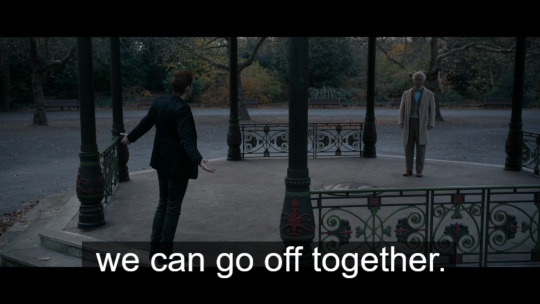
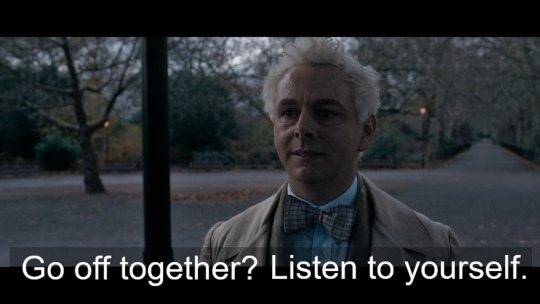
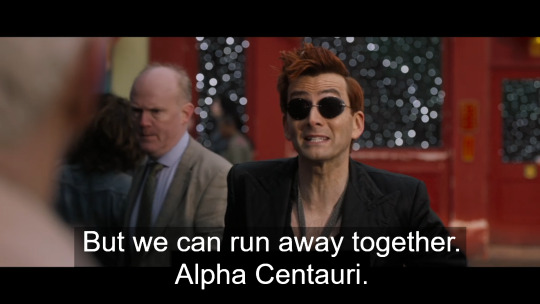
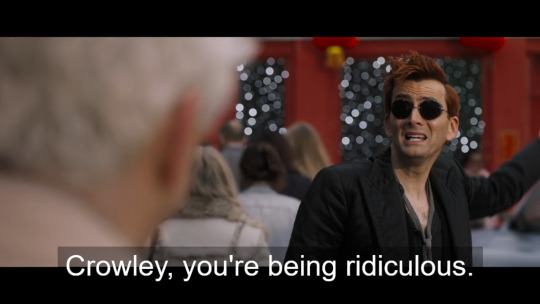

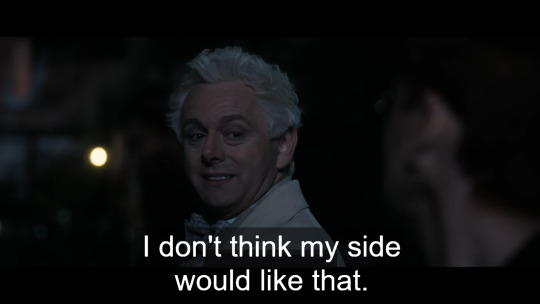
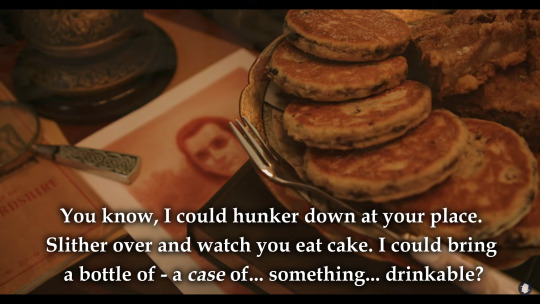
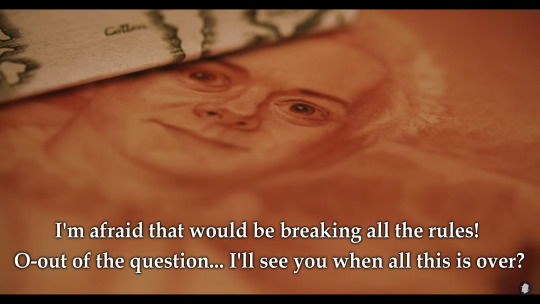
Noticed a pattern of Crowley reaching out to Aziraphale and Aziraphale rejecting him and now I'm sad
Bonus (Spoilers for Season 2!)
In the face of all that, Crowley is so brave for this

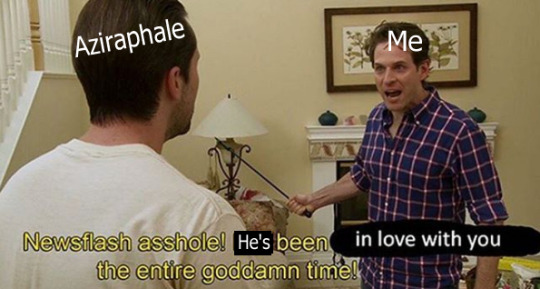
#tfw the demon crowley is the one who is honest about how much aziraphale means to him#and the angel aziraphale is the one still unwilling to admit it#im going to scream#this isnt a zira hate post i love my boy and he has his reasons#but oh my god crowley is so completely gone on him#good omens#crowley#aziraphale#aziracrow#ineffable husbands#good omens 2#good omens season 1#good omens season 2#good omens lockdown special#michael sheen#david tennant#good omens spoilers#good omens 2 spoilers#go2#I can't make gifsets but I can do this
210 notes
·
View notes
Text
OK SO HERES THE THING REGARDING AZIRAPHALE’S CHOICE
It seems that people seem to keep characterizing Aziraphale’s choice at the end to accept Metatron's proposal as him believing that Heaven is good or that he is supportive of Heaven’s plans, that he likes and wants to be a part of Heaven. But I feel, personally, that this is not entirely true.
Aziraphale has been shown, both in Season 1 but ESPECIALLY in Season 2, to disapprove of what heaven believes is right/good. He, instead, actively chooses to divert heavens plans time and time again to do what he believes to be right and good.
And for most of this time, he and Crowley together work to not do what Heaven or Hell believe is correct but what THEY feel is correct. (Even if sometimes it takes a shift in POV, or potential damnation, for that event to occur.)
So, when Metatron offers him a high position in Heaven, I do not believe he accepts it because he is supportive of the ways of Heaven necessarily but more-so that this might be an opportunity within to prevent or change the devastating actions Heaven takes (which he has witnessed first hand).
The reason he wants for Crowley to join him in Heaven is because he wants Crowley by his side. Because that it what they have always done. For millenniums, Aziraphale and Crowley together have worked to deviate the plans of Heaven (and Hell), to do instead what is not good or right by the ideals of their respective head offices, but what the two of them believe is good or right for humanity.
He is not asking Crowley to join him in Heaven because he thinks there is something wrong with Crowley (as it seems a few people have suggested), he has always believed Crowley to be lovely and kind - both when he was an angel and a demon. He does not feel that Crowley is wrong or incomplete or anything of the sort. Aziraphale is asking Crowley to come with, he wants Crowley to help him. He sees this as a chance to do what they have always done, but perhaps with more power. Maybe this time they can prevent it. Maybe this time they can keep humanity safe.


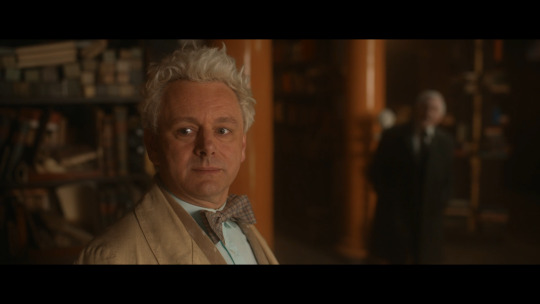
It is also interesting to note that Aziraphale has, within the dreaded last 10 minutes (lol pain), multiple moments of hesitation. The first is right before Metatron and Aziraphale leave the bookshop. He begins to presumably say something along the lines of “I think I... [made a mistake],” but looks out the window to where Crowley must be and corrects himself in Metatron’s presence. I think this is probably the most we can see Aziraphale’s true personal desire which is to be with Crowley. To stay on Earth. To live a life that he loves with the person (entity??) he loves. But here, before he can say what he truly wants, he puts on a face and marches on. It felt here to me, that Aziraphale is doing what he feels is a duty. He is putting aside his desires to go to Heaven, in hopes of being able to help humanity (NOT help Heaven).
Once outside, we are revealed a pretty vital piece of information.
METATRON: I can’t think of a better angel, to wrap things up, and put into motion the next step in the great plan.
AZIRAPHALE: Um, yes, you mentioned that. Can I know what it is?
OKAY SO FIRST. When Metatron proposed this to Aziraphale, he said that Aziraphale would be putting the next part of the great plan into motion. So I dunno about you guys but I absolutely think this was probably an alarm bell in Aziraphale’s head given what the previous step was (the Apocalypse). But understanding that this is what Metatron told Aziraphale that led to Aziraphale accepting to go with him, furthers the idea that Aziraphale is going to Heaven to try and prevent or deviate what is going to happen. He is not just going because Heaven has suddenly started talking to him again. This though, I feel, makes this all the more sad. Aziraphale is pushing down his personal desires for his notions of ‘the greater good’ aka protecting humanity as it seems.
The second moment of hesitation comes just before Aziraphale steps into the elevator, just after he is told that what he is slated to help with in Heaven is The Second Coming. He looks towards Crowley and (understandably) hesitates - because in reality, this is NOT what he wants. Ideally, he doesn’t want to be involved with Heaven, especially not alone (finally and truly alone now too... He never has fit in with the other angels has he?). But, Metatron has just told him of the next great plan, The Second Coming, and he has the realization that - despite how much he may not actually want this, despite having to leave without the love of his life by his side - he NEEDS to go. He needs to try and stop it, he needs to try and divert Heaven’s plan. And though it may not be right, he feels he needs to divert it within Heaven. Maybe then he can prevent another atrocity, maybe then he can protect the lives on Earth that he loves. He feels as though that’s his duty. So, for the second time, he fakes a smile and follows Metatron into the elevator.
Aziraphale believes (despite how much he may want to stay) that in order to try and stop disaster, in order to save lives, he has to go even if it pains him.
(Sorry if this was like super incoherent, this show melted my brain into Nickelodeon Gak.)
#hope this makes literally any sense#also please dont like bully me if u disagree or anything im sensitive af i just wanted to talk about a show i love#i really just felt ppl are mad at aziraphale which like understandable#BUT i think its interesting to really realize what he is trying to do#long post#like a hella long post im so sorry#good omens#good omens s2#good omens 2#good omens spoilers#good omens s2 spoilers#good omens 2 spoilers#literally all the spoilers please be careful#good omens season 2#neil gaiman#david tennant#michael sheen#crowley#aziraphale#ineffable husbands#go2#go2 spoilers#aziracrow#good omens meta#good omens analysis
170 notes
·
View notes
Text
i forgot that youtube comment analysis is almost never correct and just had. a solid chuckle
#marzi speaks#saw someone say aziraphale was the 'courtly love' type of character whereas crowley knew more about lust and 'pleasures of the flesh'#but hon. they're BOTH horny. aziraphale has more canonical grounds for horniness.#i mean look at the micro expressions michael sheen makes. insane. see also:#he was at the fucking hundred guineas club. THE GAY SEX CLUB FROM OSCAR WILDE TIMES#where was crowley??? bitch was sleep!! real as fuck by the way i'd depression nap for decades if i could too#also crowley is such a romantic don't even PRETENDDD#anyways aziraphale's fear for breaking the unspoken agreement is less about courtship and much more about a literal fear of god#and crowley kissed him for 2 reasons:#1: it was the only thing he could think to do to get aziraphale to listen to him#2: he had so so many feelings and he knew if he didn't kiss him now he wouldn't get to for a long long time#anyways. i'm not mad at the comment but i will take an excuse to drop my own analysis bc i think abt that scene so much
1 note
·
View note
Text
Did I just change my quota (or whatever it called under my username?) I sure did if I got this many result and how my friend gonna keep calling me Aziraphale.

#y’all I’m no longer phantom call me aziraphale/j#I’m so glad Michael Sheen doesn’t have tumblr#if he see this I will not know what to do#phantomrambles#aziraphale#i love aziraphale#if I ever find my Crowley one day it game over#this make it more ironic or maybe on par if I’m dressing up as Crowley based on my other post#good omens
0 notes
Text
Aziraphale’s Choice, the Job Connection, and Michael Sheen’s Morality
Update: Michael Sheen liked this post on Twitter, so I'm fairly certain there is a lot of validity to it.
I’ve had time to process Aziraphale’s choice at the end of Season 2. And I think only blaming the religious trauma misses something important in Aziraphale’s character. I think what happened was also Aziraphale’s own conscious choice––as a growth from his trauma, in fact. Hear me out.
Since November 2022 I’ve been haunted by something Michael Sheen said at the MCM London Comic Con. At the Q&A, someone asked him about which fantasy creature he enjoyed playing most and Michael (bless him, truly) veered on a tangent about angels and goodness and how, specifically,
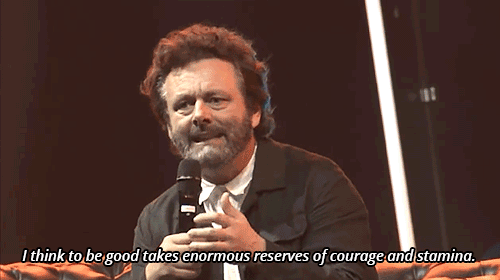
We as a society tend to sort of undervalue goodness. It’s sort of seen as sort of somehow weak and a bit nimby and “oh it’s nice.” And I think to be good takes enormous reserves of courage and stamina. I mean, you have to look the dark in the face to be truly good and to be truly of the light…. The idea that goodness is somehow lesser and less interesting and not as kind of muscular and as passionate and as fierce as evil somehow and darkness, I think is nonsense. The idea of being able to portray an angel, a being of love. I love seeing the things people have put online about angels being ferocious creatures, and I love that. I think that’s a really good representation of what goodness can be, what it should be, I suppose.
I was looking forward to BAMF!Aziraphale all season long, and I think that’s what we got in the end. Remember Neil said that the Job minisode was important for Aziraphale’s story. Remember how Aziraphale sat on that rock and reconciled to himself that he MUST go to Hell, because he lied and thwarted the will of God. He believed that––truly, honestly, with the faith of a child, but the bravery of a soldier.
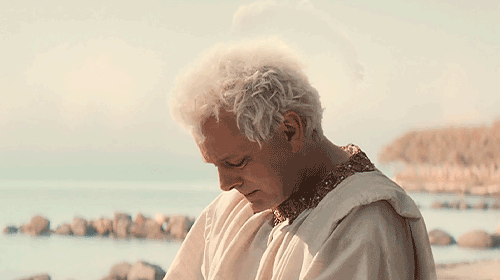
Aziraphale, a being of love with more goodness than all of Heaven combined, believed he needed to walk through the Gates of Hell because it was the Right Thing to do. (Like Job, he didn’t understand his sin but believed he needed to sacrifice his happiness to do the Right Thing.)
That’s why we saw Aziraphale as a soldier this season: the bookshop battle, the halo. But yes, the ending as well.
Because Aziraphale never wanted to go to Heaven, and he never wanted to go there without Crowley.
But it was Crowley who taught him that he could, even SHOULD, act when his moral heart told him something was wrong. While Crowley was willing to run away and let the world burn, it was Aziraphale (in that bandstand at the end of the world) who stood his ground and said No. We can make a difference. We can save everyone.

And Aziraphale knew he could not give up the ace up his sleeve (his position as an angel) to talk to God and make them see the truth in his heart.
I was messed up by Ineffable Bureaucracy (Boxfly) getting their happy ending when our Ineffable Husbands didn’t, but I see now that them running away served to prove something to Aziraphale. (And I am fully convinced that Gabriel and Beelzebub saw the example of the Ineffables at the Not-pocalypse and took inspiration from them for choosing to ditch their respective sides)
But my point is that Aziraphale saw them, and in some ways, they looked like him and Crowley. And he saw how Gabriel, the biggest bully in Heaven, was also like him in a way (a being capable of love) and also just a child when he wasn’t influenced by the poison of Heaven. Muriel, too, wasn’t a bad person. The Metatron also seemed to have grown more flexible with his morality (from Aziraphale's perspective). Like Earth, Heaven was shades of (light?) gray.
Aziraphale is too good an angel not to believe in hope. Or forgiveness (something he’s very good at it).
Aziraphale has been scarred by Heaven all his life. But with the cracks in Heaven’s armor (cracks he and Crowley helped create), Aziraphale is seeing something else. A chance to change them. They did terrible things to him, but he is better than them, and because of Crowley, he feels ready to face them.
(Will it work? Can Heaven change, institutionally? Probably not, but I can't blame Aziraphale for trying.)
At the cafe, the Metatron said something big was coming in the Great Plan. Aziraphale knows how trapped he had felt when he didn’t have God’s ear the first time something huge happened in the Big Plan. He can’t take a chance again to risk the world by not having a foot in the door of Heaven. That’s why we saw individual human deaths (or the threat of death) so much more this season: Elspeth, Wee Morag, Job’s children, the 1940s magician. Aziraphale almost killed a child when he couldn’t get through to God, and he’s not going through that again.
“We could make a difference.” We could save everyone.

Remember what Michael Sheen said about courage and doing good––and having to “look the dark in the face to be truly good.” That’s what happened when Aziraphale was willing to go to Hell for his actions. That’s what happened when he decided he had to go to Heaven, where he had been abused and belittled and made to feel small. He decided to willingly go into the Lion’s Den, to face his abusers and his anxiety, to make them better so that they would not try to destroy the world again.
Him, just one angel. He needed Crowley to be there with him, to help him be brave, to ask the questions that Heaven needed to hear, to tell them God was wrong. Crowley is the inspiration that drives Aziraphale’s change, Crowley is the engine that fuels Aziraphale’s courage.
But then Crowley tells him that going to Heaven is stupid. That they don’t need Heaven. And he’s right. Aziraphale knows he’s right.
Aziraphale doesn’t need Heaven; Heaven needs him. They just don’t know how much they need him, or how much humanity needs him there, too. (If everyone who ran for office was corrupt, how can the system change?)
Terry Pratchett (in the Discworld book, Small Gods) is scathing of God, organized religion, and the corrupt people religion empowers, but he is sympathetic to the individual who has real, pure faith and a good heart. In fact, the everyman protagonist of Small Gods is a better person than the god he serves, and in the end, he ends up changing the church to be better, more open-minded, and more humanist than god could ever do alone.
Aziraphale is willing to go to the darkest places to do the Right Thing, and Heaven is no exception. When Crowley says that Heaven is toxic, that’s exactly why Aziraphale knows he needs to go there. “You’re exactly is different from my exactly.”
____
In the aftermath of Trump's election in the US, Brexit happened in 2018. Michael Sheen felt compelled to figure out what was going on in his country after this shock. But he was living in Los Angeles with Sarah Silverman at the time, and she also wanted to become more politically active in the US.
Sheen: “I felt a responsibility to do something, but it [meant] coming back [to Britain] – which was difficult for us, because we were very important to each other. But we both acknowledge that each of us had to do what we needed to do.” In the end, they split up and Michael moved back to the UK.
Sometimes doing the Right Thing means sacrificing your own happiness. Sometimes it means going to Hell. Sometimes it means going to Heaven. Sometimes it means losing a relationship.
And that’s why what happened in the end was so difficult for Aziraphale. Because he loves Crowley desperately. He wants to be together. He wanted that kiss for thousands of years. He knows that taking command of Heaven means they would never again have to bow to the demands of a God they couldn’t understand, or run from a Hell who still came after them. They could change the rules of the game.
And he’s still going to do that. But it hurts him that he has to do that alone.
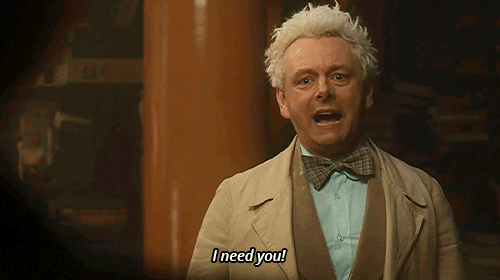
#good omens#good omens 2#ineffable husbands#it's kinda like capt america: civil war#with Azi as Tony Stark: traumatized and trying to do the right thing#and Crowley being Steve Rogers: fuck the establishment let's go rogue#gos2spoilers#good omens meta#good omens 2 meta#go s2#michael sheen#go s2 meta#go meta#*mine#*mymeta#ineffables husbands#ineffable soulmates#*mybest
11K notes
·
View notes
Text
Aziraphale's voice - Michael Sheen's voice
I know we all have talked a lot about Michael Sheen's ability to manage microexpressions with his face, but this post is to mark another really interesting character crafting decision: his voice.
I believe that, If you are a hearing person and you watch Good Omens in its original language, identifying Aziraphale's pitch, tone and timbre is really easy. That's because it is slightly higher and more of a dulcet tone than the usual Michael Sheen voice (which usually is more deep and lower).
However, there are three times when Aziraphale uses the "Michael Sheen voice" in season 2 (I'm not sold on having heard it during season 1). All of them are on point for the character and I love the acting choice, so I came here to share:
I have already seen this one discussed, so it goes first: the "Azirapalala- Aziraphale" moment, when correcting Furfur in the e04 minisode. It is made even funnier because we have already seen him being so happily flamboyant... And his voice going lower with the annoyance of correcting his name is precious.
When he vows to protect Gabriel, during the final defense of the bookshop, in e06. “You came to me, I said I would protect you And I will”. His voice shifts as he makes that last point clear, and suddenly his Sheen voice becomes the sign of his commitment to keep his word. He doesn't use that voice when menacing the demons; he goes with a more "Aziraphale tone", while having his face do the "fierce" work.
My personal favorite: during e01, when Crowley comes back after their fight, trying to keep his cool, and Aziraphale is so not having it. He uses his natural register when he says he wants "a proper apology, actually". And he practically keeps that tone until the apology is finished.
@susanwhynow noticed (and I had absolutely MISSED) that when he answers the "Smitten. I believe." he is using his Michael voice. I was fooled by the "You're being silly!" being delivered in a tender, usual Aziraphale manner... But yeah, one of the best lines of these two being sweet is in "Michael tone". Do with this what you want :D
That is quite an acting choice! When a character is built around choices that separate them so clearly from the person who performs them, deciding to use the "natural" repertoire is really meant to make an impact. It is a really subtle voice work, but goes a long way to convey the seriousness of those moments for Aziraphale.
And I brought this here just to present my respects to Michael Sheen for those choices!!
#good omens 2#aziraphale#michael sheen#good omens#michael sheen appreciation post#acting craft#great acting choices
3K notes
·
View notes
Text
'...“It’s fun playing bad, but actually he’s not,” the actor says, smiling as he reflects on his character, Crowley. “He’s a villain with a heart. The amount of really evil things he does are vanishingly small.”
...As it always has, “Good Omens” dissects the view of good and evil as absolutes, showing viewers that they are not as separate as we were led to believe growing up. Aziraphale and Crowley’s long-standing union is proof of this. The show also urges people to look at what defines our own humanity. For Tennant — who opted to wear a T-shirt emblazoned with the words “Leave trans kids alone you absolute freaks” during a photocall for Season 2 — these themes are more important now than ever before.
“In this society that we’re currently living in, where polarization seems ever more present, fierce and difficult to navigate. Negotiation feels like a dirty word at times,” he says, earnestly. “This is a show about negotiation. Two extremes finding common ground and making their world a better place through it. Making life easier, kinder and better. If that’s the sort of super objective of the show, then I can’t think of anything more timely, relevant or apt for the rather fractious times we’re living in.”
“Good Omens” is back by popular demand for another season. How does it feel?
It’s lovely. Whenever you send something out into the world, you never quite know how it will land. Especially with this, because it was this beloved book that existed, and that creates an extra tension that you might break some dreams. But it really exploded. I guess we were helped by the fact that we had Neil Gaiman with us, so you couldn’t really quibble too much with the decisions that were being made. The reception was, and continues to be, overwhelming.
Now that you’re no longer bound by the original material that people did, perhaps, feel a sense of ownership over, does the new content for Season 2 come with a sense of freedom for you? This is uncharted territory, of sorts.
That’s an interesting point. I didn’t know the book when I got the script. It was only after that I discovered the worlds of passion that this book had incited. Because I came to it that way, perhaps it was easier. I found liberation from that, to an extent. For me, it was always a character that existed in a script. At first, I didn’t have that extra baggage of expectation, but I acquired it in the run-up to Season 1 being released… the sense that suddenly we were carrying a ming vase across a minefield.
In Season 2, we still have Neil and we also have some of the ideas that he and Terry had discussed. During the filming of the first one, Neil would drop little hints about the notions they had for a prospective sequel, the title of which would have been “668: The Neighbour of the Beast,” which is a pretty solid gag to base a book around. Indeed there were elements like Gabriel and the Angels, who don’t feature in the book, that were going to feature in a sequel. They were brought forward into Season 1. So, even in the new episodes, we’re not entirely leaving behind the Terry Pratchett-ness of it all.
It’s great to see yourself and Michael Sheen reunited on screen as these characters. Fans will have also watched you pair up for Season 3 of “Staged.” You’re quite the dynamic duo. What do you think is the magic ingredient that makes the two of you such a good match?
It’s a slightly alchemical thing. We knew each other in passing before, but not well. We were in a film together [“Bright Young Things,” 1993] but we’d never shared a scene. It was a bit of a roll of the dice when we turned up at the read-through for “Good Omens.” I think a lot comes from the writing, as we were both given some pretty juicy material to work with. Those characters are beloved for a reason because there’s something magical about them and the way they complete each other. Also, I think we’re quite similar actors in the way we like to work and how we bounce off each other.
Does the shorthand and trust the two of you have built up now enable you to take more risks on-screen?
Yes, probably. I suppose the more you know someone, the more you trust someone. You don’t have to worry about how an idea might be received and you can help each other out with a more honest opinion than might be the case if you were, you know, dancing around each other’s nervous egos. Enjoying being in someone’s orbit and company is a positive experience. It makes going to work feel pleasant, productive, and creative. The more creative you can be, the better the work is. I don’t think it’s necessarily a given that an off-screen relationship will feed into an on-screen one in a positive or negative way. You can play some very intimate moments with someone you barely know. Acting is a peculiar little contract, in that respect. But it’s disproportionately pleasurable going to work when it’s with a mate.
Fans have long discussed the nature of Crowley and Aziraphale’s relationship. In Season 2, we see several of the characters debate whether the two are an item, prompting them to look at their union and decipher what it is. How would you describe their relationship?
They are utterly co-dependent. There’s no one else having the experience that they are having and they’ve only got each other to empathize with. It’s a very specific set of circumstances they’ve been dealt. In this season, we see them way back at the creation of everything. They’ve known each other a long time and they’ve had to rely on each other more and more. They can’t really exist one without the other and are bound together through eternity. Crowley and Aziraphale definitely come at the relationship with different perspectives, in terms of what they’re willing to admit to the relationship being. I don’t think we can entirely interpret it in human terms, I think that’s fair to say.
Yet fans are trying to do just that. Do you view it as beyond romantic or any other labels, in the sense that it’s an eternal force?
It’s lovely [that fans discuss it] but you think, be careful what you wish for. If you’re willing for a relationship to go in a certain way or for characters to end up in some sort of utopian future, then the story is over. Remember what happened to “Moonlighting,” that’s all I’m saying! [Laughs]
Your father-in-law, Peter Davison, and your son, Ty Tennant, play biblical father-and-son duo Job and Ennon in Episode 2. In a Tumblr Q&A, Neil Gaiman said that he didn’t know who Ty’s family was when he cast him. When did you become aware that Ty had auditioned?
I don’t know how that happened. I do a bunch of self-tapes with Ty, but I don’t think I did this one with him because I was out of town filming “Good Omens.” He certainly wasn’t cast before we started shooting. There were two moments during filming where Neil bowled up to me and said, “Guess, who we’ve cast?” Ty definitely auditioned and, as I understand it, they would tell me, he was the best. I certainly imagine he could only possibly have been the best person for the job. He is really good in it, so I don’t doubt that’s true. And then my father-in-law showed up, as well, which was another delicious treat. In the same episode and the same family! It was pretty weird. I have worked with both of them on other projects, but never altogether.
There’s a “Doctor Who” cameo, of sorts, in Episode 5, when Aziraphale uses a rare annual about the series as a bartering tool. In reality, you’ll be reprising your Time Lord role on screen later this year in three special episodes to mark the 60th anniversary. Did you always feel you’d return to “Doctor Who” at some point?
There’s a precedent for people who have been in the series to return for a multi-doctor show, which is lovely. I did it myself for the 50th anniversary in 2013, and I had a wonderful time with Matt [Smith]. Then, to have John Hurt with us, as well, was a little treat. But I certainly would never have imagined that I’d be back in “Doctor Who” full-time, as it were, and sort of back doing the same job I did all those years ago. It was like being given this delightful, surprise present. Russell T Davies was back as showrunner, Catherine Tate [former on-screen companion] was back, and it was sort of like the last decade and a half hadn’t happened.
Going forward, Ncuti Gatwa will be taking over as the new Doctor. Have you given him any advice while passing the baton?
Oh God, what a force of nature. I’ve caught a little bit of him at work and it’s pretty exciting. I mean, what advice would you give someone? You can see Ncuti has so much talent and energy. He’s so inspired and charismatic. The thing about something like this is: it’s the peripherals, it’s not the job. It’s the other stuff that comes with it, that I didn’t see coming. It’s a show that has so much focus and enthusiasm on it. It’s not like Ncuti hasn’t been in a massive Netflix series [“Sex Education,”] but “Doctor Who” is on a slightly different level. It’s cross-generational, international, and has so much history, that it feels like it belongs to everyone.
To be at the center of the show is wonderful and humbling, but also a bit overwhelming and terrifying. It doesn’t come without some difficulties, such as the immediate loss of anonymity. It takes a bit of getting used to if that’s not been your life up to that point. I was very lucky that when I joined, Billie Piper [who portrayed on-screen companion, Rose] was still there. She’d lived in a glare of publicity since she was 14, so she was a great guide for how to live life under that kind of scrutiny. I owe a degree of sanity to Billie.
Your characters are revered by a few different fandoms. Sci-fi fandoms are especially passionate and loyal. What is it like being on the end of that? I imagine it’s a lot to hold.
Yes, certainly. Having been a fan of “Doctor Who” since I was a tiny kid, you’re aware of how much it means because you’re aware of how much it meant to you. My now father-in-law [who portrayed Doctor Who in the 80s] is someone I used to draw in comic strips when I was a kid. That’s quite peculiar! It’s a difficult balance because on one end, you have to protect your own space, and there aren’t really any lessons in that. That does take a bit of trial and error, to an extent, and it’s something that you’re sometimes having to do quite publicly. But, it is an honor and a privilege, without a doubt. As you’ve said, it means so much to people and you want to be worthy of that. You have to acknowledge that and be careful with it. Some days that’s tough, if you’re not in the mood.
I know you’re returning to the stage later this year to portray Macbeth. You’ve previously voiced the role for BBC Sounds, but how are you feeling about taking on the character in the theater?
I’m really excited about it. It’s been a while since I’ve done Shakespeare. It’s very thrilling but equally — and this analogy probably doesn’t stretch — it’s like when someone prepares for an Olympic event. It does feel like a bit of a mountain and, yeah, you’re daring to set yourself up against some fairly worthy competition from down the years. That’s both the challenge and the horror of doing these types of things. We’ve got a great director, Max Webster, who recently did “Life of Pi.” He’s full of big ideas. It’s going to be exciting, thrilling, and a little bit scary. I’m just going to take a deep breath.
Before we part ways, let’s discuss the future of “Good Omens.” Gaiman has said that he already has ideas for Season 3, should it happen. If you were to do another season, is there anyone in particular you’d love to work with next time around or anything specific you’d like to see happen for Crowley?
Oh, Neil Gaiman knows exactly where he wants to take it. If you’re working with people like Gaiman, I wouldn’t try to tamper with that creative void. Were he to ask my opinion, that would be a different thing, but I can’t imagine he would. He’s known these characters longer than me and what’s interesting is what he does with them. That’s the bit that I’m desperate to know. I do know where Crowley might end up next, but it would be very wrong if I told you.
[At this point, Tennant picks up a pencil and starts writing on a hotel pad of paper.]
I thought you were going to write it down for me then. Perhaps like a clandestine meeting on a bench in St James’ Park, but instead you’d write the information down and slide it across the table…
I should have done! I was drawing a line, which obviously, psychologically, I was thinking, “Say no more. You’re too tempted to reveal a secret!” It was my subconscious going “Shut the fuck up!”
#David Tennant#Michael Sheen#Good Omens#Neil Gaiman#Terry Pratchett#Ty Tennant#Peter Davison#Aziraphale#Crowley#Doctor Who#Macbeth#Ncuti Gatwa#Job#Ennon#Bright Young Things#Series 2#Matt Smith#John Hurt#Russell T. Davies#Catherine Tate#Max Webster#Life of Pi#Sex Education#Billie Piper#Rose Tyler#BBC Sounds
3K notes
·
View notes
Note
picture this. you're michael sheen, beloved queer-friendly welsh actor and recent twilight saga vampire. you want your favorite book to become a tv show, and you want to be the lead. so what do you do? you befriend the author. he wines and dines you, you become a confidant in the scriptwriting phase. and in the process of the GO script you decide you don't want to be crowley, actually, you want to be aziraphale. you put in the work for months to influence the author to the same conclusion. so when neil gaiman comes to you one day saying, "i know you joined on to be crowley... but how would you feel about playing aziraphale?" you say, what a novel idea! i was feeling the same way, i just didn't want to say anything! let's do it.
you're michael sheen, the lead in the adaptation of your favorite book. you meet david tennant as your leading man, a rising star (and vocal fan of yours) you've had a few vague interactions with in the past. on set you immediately find the closest friend you have ever and will ever find in your life, and you know this. the romance you have in your (yes, your) show is ambiguous, but you're michael sheen. you think that romance needs to be explicit. so what do you do? you become a nightmare on set. you get really hands-on; you make costume choices, you make story decisions, you tell your author friend at the very end of filming: aziraphale is in love with crowley and realizes it in 1941. now go do it again.
so the author goes and does it again. you get a season 2. you get 1941 part 2. you're michael sheen, and you are the lead of the adaptation of your favorite book, and the romance you littered into the character you built from the ground up has become unambiguous. everything goes according to plan. but, you see, you have a problem: the author you have baby trapped is acting a FIEND on twitter and tumblr. he's saying everything he can to imply aziraphale and crowley aren't sexually attracted to each other. he's getting a bit too bold with his character assumptions, is all i'm saying. so here's what you're going to do: you play it up with your pal david tennant. you made a show with him during lockdown. you're going to depict your lives as even more intertwined and homoerotically codependent as previously possible. you grow even closer. your wives become best friends, too, because how could they not? this has been the plan since the beginning, too. your lockdown show ends. it wasn't enough.
so you, michael sheen, of course you put in the work. if david tennant's there, you're damn sure you're there physically, spiritually, biblically, in whatever capacity you can be. it's not hard. david tennant is a big fan of yours, after all, so he MAKES SURE you're always in the conversation. you have him wrapped around your little finger, this lovely little boy, and so you know what you do next? you become neighbors. you make your directorial debut casting your best friend's wife watching her husband and male neighbor initiate sex with each other. you play into the swinging rumors (that you, michael sheen, had started). you create a narrative that you and david tennant are two homoerotic besties, and is there more going on in the background there? any deeper conspiracy? who really knows, but what you do know is that the world is talking about it.
and you, michael sheen, your entire acting career has led to this moment, your gay quips, your oscar wilde sex scene (and the interviews following), all of your queer roles, EVERYTHING has brought us to this conclusion. you have created the lab perfect conditions where season 3 must have an explicit gay sex scene. i'm sorry neil, my hands are tied! the people are clamoring for me and david tennant to have sex-- i mean aziraphale and crowley to have sex, the public decided this all on their own! i really don't think you have much choice. but of course, i would never deign to tell an author how to practice his veritable craft. i concede to whatever version of series 3 you create, and i will happy to bring this beloved character to his deserved ending.
and why do you say this? because you're michael sheen. you're just an actor who incidentally stumbled his way into leading the queer romance adaptation of your favorite book that wasn't a romance, and you just read the script the way that it was given to you. and if series 3 means an explicit sex scene between you and your best friend david tennant, then what a lovely coincidence that you had absolutely no part in making happen. because what power do you really have?
This is my favorite book I’ve read so far this year. A rare occasion where the author pulls off use of the second person pov. I really felt like I was a beloved welsh actor crossed with Machiavelli when I read this
760 notes
·
View notes
Text
this one is thanks to a post by @thegroovyfool because she is very much correct - we do not talk about aziraphale's "i need you" enough.
so once again, with a deep breath and a sigh, welcome back to alex's unhinged meta corner, where i tear apart the confession scene frame by frame. i'm gonna say, watching this particular clip over and over and focusing on aziraphale's face almost took me out.
let's get into it.
first, how about a little look at our starting point. (any blurry screencaps are due to a LOT of movement on michael's part rip)
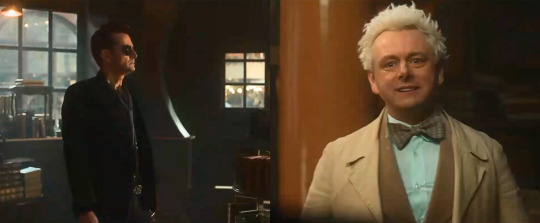
crowley is very pointedly facing away from him, he turned after aziraphale said "we can be together - angels!", presumably because being offered exactly what he wants in the one way he cannot have it fried his brain, cause besties it surely fried mine.
aziraphale on the other hand looks openly desperate, which is why he says "i need you." more on that later. let's have a look at how he says it, because michael "microexpressions" sheen is putting in the work.
to me, he seems close to tears, his eyes are glistening in that specific "i'm about to cry my eyes out" way i know from looking in the mirror while crying

he is trying to get crowley to listen to him and to turn around. he wants crowley to face him, which is something most people tend to want during an argument. talking to someone who is not looking at you tends to make someone frustrated and like they're not hearing you/do not care about what you have to say.
aziraphale looks close to despair, his i need you is a plea to crowley to come with him. he is opening himself up not just emotionally but physically, too.

he slightly leans forward, his arms are raised and seem to both slightly grasp for crowley and point towards his chest/heart for emphasis. the pure pain visible on his face knocks the air out of me every single time i look at it.

aziraphale is admitting to needing him, something he has never done before, hell, he has told him the exact opposite on numerous occasions. i don't need you. and while they both knew it was a) a lie and b) a way for him to deal with his conflicting emotional standpoints and cognitive dissonance, it still hurt crowley every. single time.
crowley was there for him no matter what, he knows aziraphale needs him but he came back and remained at his side even when he was pushed away and more or less openly insulted. he endured it all.
aziraphale saying i need you now is pretty much a slap in the face but also what crowley needs to hear. as with everything that happens during the entire conversation, the timing is fucked up and they're talking past each other.
in my opinion, that is why crowley does not react.
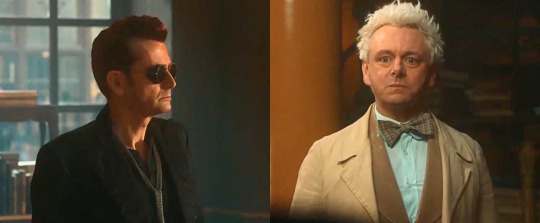
only when aziraphale turns spiteful and starts questioning his understanding (aka calling him stupid without outright saying it) does he re-enter the conversation.
aziraphale, however, is upset. now, i will put on my tinhat for just a second and turn up the insanity because there are two more things i want to talk about.
first, the little stutter at the beginning.
"i ngk - i need you."
my question is - why? why does he stumble over these words in particular when it does not happen with any other sentence? the only other time is right after crowley walks away with his "good luck", he stumbles over crowley's name.
so, in short, it happens when he is either caught off-guard or saying something incredible emotional.
and this, everyone, is where i go unhinged in my interpretation.
what if he initially did not want to say "i need you?" what if he was so caught up in getting crowley to stay/come with him that he did not think and almost confessed another three word sentence?
what if he was about to say "i love you" but stopped himself because no, that's too direct, they don't do that, they can't do that. it goes against EVERYTHING they have silently build over the last six thousand years. so he chokes on it. he chokes on it and instead he says "i need you" because it means the same thing.
i need you. don't leave me. come with me. be an us. go off together.
i forgive you. i love you.
they say it over and over again because that's the only way they can say it.
that is why aziraphale is so angry and upset after saying it. he told crowley he loves him, he needs him, and all he got in return was silence.
the funny part is that this code may have worked before, but it no longer does. crowley is too hurt to listen to what aziraphale is trying to tell him, and aziraphale is equally as hurt and also not listening anymore.
the funny part is that it stopped being about love and started being about sides again. my side, your side, our side. choose a side, choose our side, choose me.
the funny part is that beelzebub and gabriel told them what they need to do, i found something that mattered more to me than choosing sides.
#alex talks good omens#good omens#ineffable husbands#crowley#aziraphale#good omens season 2#go2#aziracrow#crowley x aziraphale#good omens meta#ineffable divorce#this was spontaneous i saw the post and my brain went i need to do this right now#so i did#anyway if u disagree with my conclusions thats fine i disagree with my own theories often enough#otherwise fandom wouldnt be any fun
1K notes
·
View notes
Note
I was curious how you manage to keep features consistent when you draw them? Do you use models? Is there a model for Crowley? He is very handsome.
I don't use models per se, but I sometimes keep files of photos or art that resembles the subject.
Crowley is based a bit on the French actor Alain Delon who was once considered the handsomest man in the world. He doesn't look exactly like Delon, but that is in my head when I draw him. I recall reading Neil and Mr. Pratchett once considered Peter Sellers for Crowley.
There is no reference for Aziraphale because he is entirely in my head and I can't really find anyone who looks exactly the way he does. I recall reading that Neil and Mr. Pratchett thought of Brian Dennehy at one point, but my head canon Aziraphale won. I think a Brian Dennehy Aziraphale would have been amazing, though. Anyway, he is actually kind of hard for me to draw because his facial structure is a bit outside my usual style. His face is a bit long and his eyes closer together than I normally do, and if I'm not careful, he slips away. He appears younger and more classically handsome as an angel than he does in his corporeal form, but I think he's quite fetching as a bookseller.
Michael Sheen is so perfect in this role it is really hard not to leak bits of his performance into the graphic novel edition, but I have to resist the impulse. I am not allowed to use any of the show actors as models.
I adore Michael Sheen. Who doesn't?
Adam is also a head canon character. He is a perfect young Greek God, so that's kind of drawing on a day with a Y in it for me.
The inspiration for Newt I'm keeping a secret. I submitted a number of sketches for Newt. The show Newt dug in deep and I had a hard time shaking him off.
The Them are based on kids I knew. They're in my head, I don't need any photos. They don't really look like the kinds in the show. The book version of Pepper, for example, is a freckled red-head.
Anathema is an amalgam of features that don't come from one person, which I think fits the description of the character. She's also unusual for me to draw but she's easier to draw than Aziraphale. I nail her every time.
Hastur is a caricature of the stereotypical English upper class you'd see in broadsheets 200 years ago. I have a file of pictures of Anthony Ashley-Cooper, 7th Earl of Shaftesbury for Hastur. I considered making Hastur more handsome in a Duke of Hell sort of way, but I think Hastur likes to be scary. I keep thinking of Peter O'Toole when I draw Hastur, too.
I feel kind of bad basing Hastur on Lord Ashley because he was a wonderful person and I'm sure he didn't go to Hell.
Ligur is a broad caricature of Danny Devito. I obviously can't use a DeVito portrait. That would be wrong. But I can tweak from there and come up with a general idea of the face I want to use.
Beelzebub and Metatron are head canon, and don't look a thing like they do in the show. I postulate some demons prefer to look like their angelic selves, and at other times prefer to be fearsome. Crowley can look fearsome when he wants, for example. In the book, Beelzebub appears as a young man in red flames.
Shadwell was drawn from reference at the direct suggestion of Neil.
Madame Tracy is based on a certain person, but no one you would have heard of. The original source might not be flattered, but I love Madam Tracy. She's really easy to draw because she's a bit over the top. I'm sketching around her scenes right now because I don't have final approval on some things yet. So she might need some changes later.
War is head canon, very easy to draw. She's a knockout. No reference required.
Famine looks a lot like Famine in the show, actually, but that's what Famine always looked like, pretty much. Except he has the grey eyes he has in the book.
Pollution is initially described as being a forgettable white guy, but later described as looking like a romantic poet, which strikes me as being memorable. Because he's only on one page in his forgettable white guy phase, I chose not to make major changes in his appearance between those panels and later when he appears as his true self, because that's a bit more confusing than it needs to be in the graphic novel edition. He's rather glamorous as the essence of Pollution, though. No reference needed.
Dog is a dog.
While I do give every detail a lot of thought, I am sure other people have other opinions. I understand that, and hope you enjoy what I do anyway.
Thanks for your question.
I'm still a bit under the weather, so may be stepping away from the net for awhile so I can concentrate on work. I have a lot of sick time to make up.
But don't think I don't appreciate your interest in the Good Omens graphic novel adaptation. Your wonderful support is acting on me like a tonic, let me tell you.
kickstarter
2K notes
·
View notes
Text
I want to talk about THAT smile. The one from the elevator. The one that scares us (or maybe just me).
This one:

It's stayed with me since the first time I saw it. Michael Sheen is an absolute master of his face, so this sinister smile means something. I don't believe that it's a forced smile that he's pasting on before he enters Heaven. It looks absolutely malevolent.
And I just couldn't figure out WHY.
Aziraphale just left everything he loves behind: humans, food, bookshop, and Crowley. Crowley most of all. He was devastated after that kiss, devastated that Crowley wouldn't just come with him so they could be together. He was hurt, shattered, unsure of himself and his decision. So why the practically evil face?
I don't subscribe to the Coffee Theory. I think it takes too much away from the emotional and character development and everything the fandom went through in those last 10 minutes for Neil to pull the rug out from under us like that.
So if he's not drugged, then what's the face?
The Metatron just dropped a bomb on him. The Second Coming. Heaven's going to restart the apocalypse. End the Earth. The place where he'd just left the love of his life and everything he holds dear. Make everything they'd fought for absolutely meaningless.
And then I remembered this face:
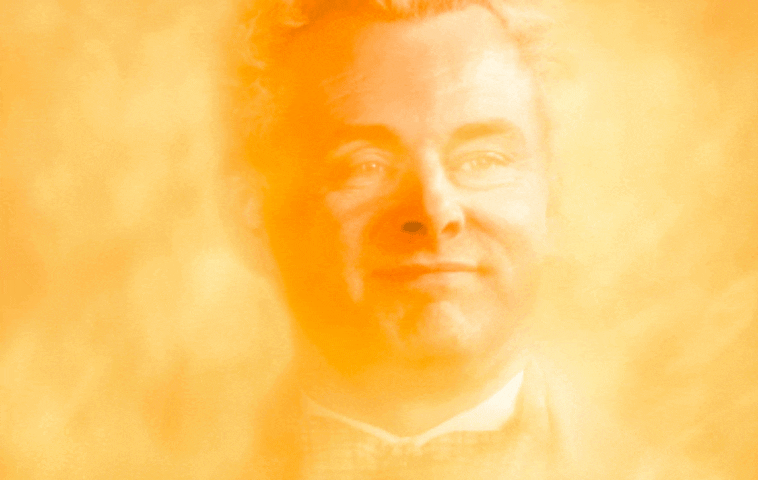
See how similar they are?
I've seen a lot of people put this down to a repeat body swap theory, but I don't buy that either. I think that would be less inspired than what we've come to expect from the brilliance of Neil's and Terry's minds.
I'm going on a bit of a tangent here for a second, but I promise it will make sense in a minute. When the demons were coming for them, Nina told Aziraphale that he shouldn't wait to be saved by Crowley, that he should come up with his own plans and save himself. And he did, but it wasn't a total plan. It was the beginnings of one. He held them off, but when his plan ran out of time, it put him and the two humans (except maybe not -> looking at you, Maggie) he's come to care about at risk. Then he had to do something reckless and probably stupid, and it worked, but it was too close.
Back to the matter at hand:
These two perfectly wonderful, complete f*cking morons have spent the last 4 years together. Probably daily. And do you know what happens when you spend so much time together?
You start picking up the other person's mannerisms, mirroring speech patterns and body language.
My theory:
Aziraphale spent that elevator ride coming up with a plan. He's come up with something that he thinks will be so clever, so unexpected of him (an angel), so Crowley-esque, that the Metatron will never see it coming. And he's not about to cock it up like he did in the bookshop, show up with only a half-baked plan.
No. He's got something positively diabolical. Something inspired by Crowley. So he makes the face that he's learned from spending four years in the daily company of the original owner of that expression. The only face he could possibly make when figuring out how to save the world and get back to his demon. And thinking about how much he can't wait to tell a Crowley how clever he's been.
That face is 6000 years of togetherness in the making.
#good omens meta#good omens spoilers#good omens s2 spoilers#gos2 spoilers#gos2 meta#elevator smile#aziraphale elevator#crowley x aziraphale#aziraphale x crowley#good omens season 2 spoilers#go2#aziraphale#ineffable husbands#ineffable idiots#good omens
1K notes
·
View notes
Text
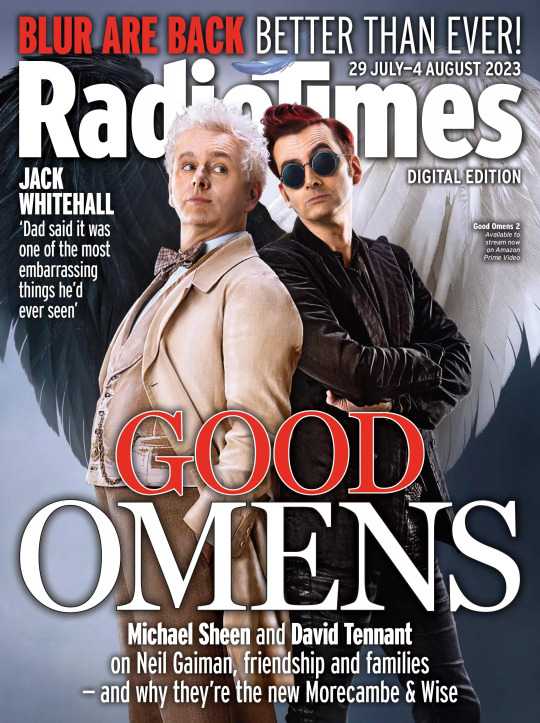
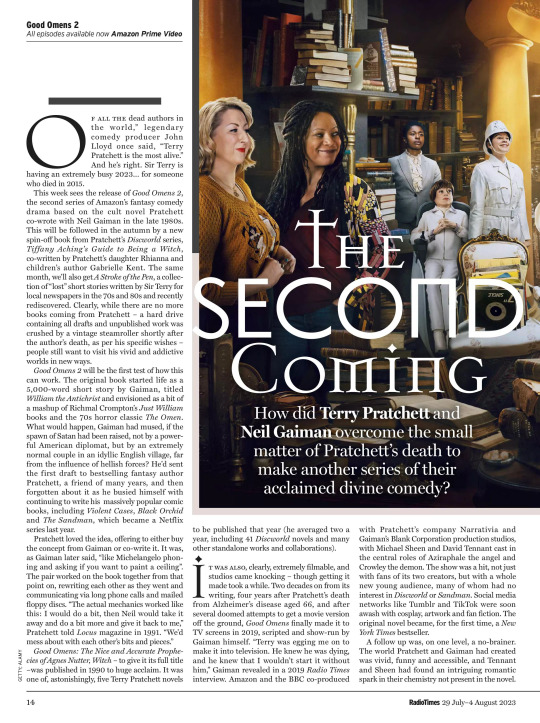
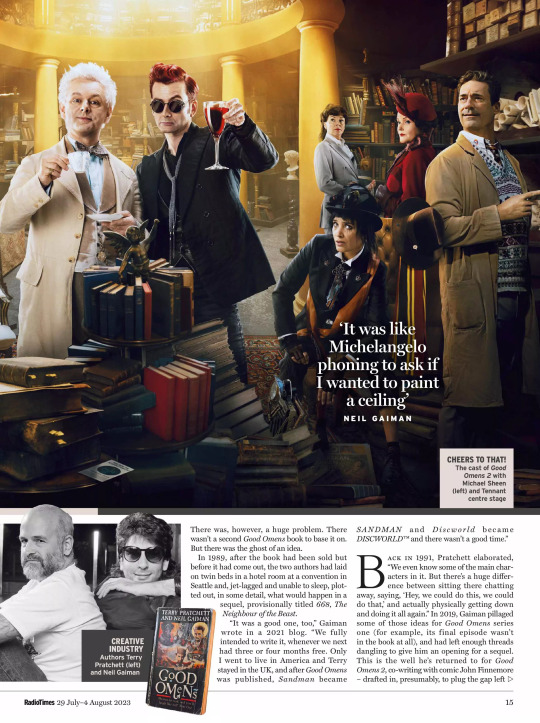
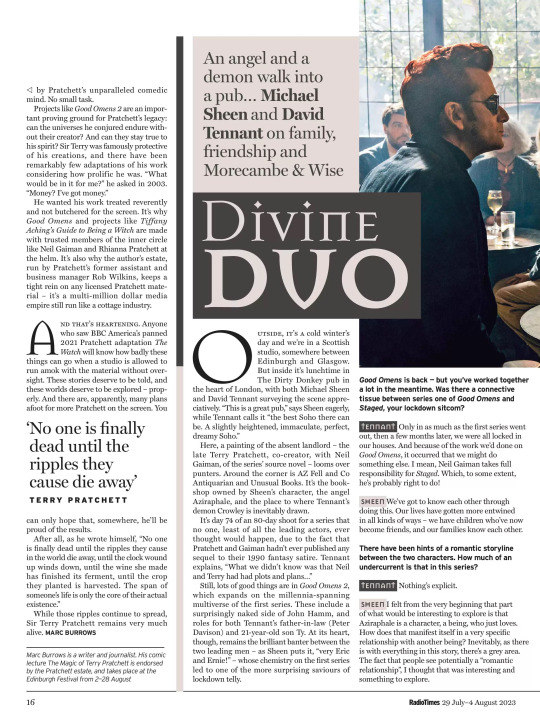
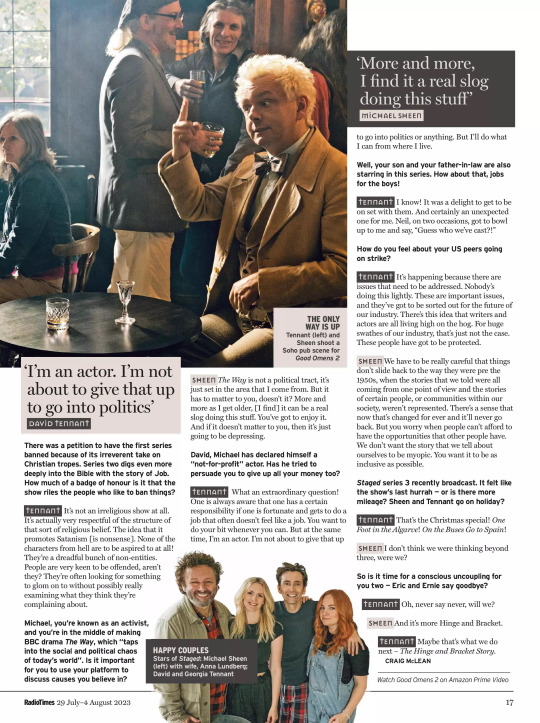
The Radio Times magazine from the 29 July-04 August 2023 :)
THE SECOND COMING
How did Terry Pratchett and Neil gaiman overcome the small matter of Pratchett's death to make another series of their acclaimed divine comedy?
For all the dead authors in the world,” legendary comedy producer John Lloyd once said, “Terry Pratchett is the most alive.” And he’s right. Sir Terry is having an extremely busy 2023… for someone who died in 2015.
This week sees the release of Good Omens 2, the second series of Amazon’s fantasy comedy drama based on the cult novel Pratchett co-wrote with Neil Gaiman in the late 1980s. This will be followed in the autumn by a new spin-off book from Pratchett’s Discworld series, Tiffany Aching’s Guide to Being a Witch, co-written by Pratchett’s daughter Rhianna and children’s author Gabrielle Kent. The same month, we’ll also get A Stroke of the Pen, a collection of “lost” short stories written by Sir Terry for local newspapers in the 70s and 80s and recently rediscovered. Clearly, while there are no more books coming from Pratchett – a hard drive containing all drafts and unpublished work was crushed by a vintage steamroller shortly after the author’s death, as per his specific wishes – people still want to visit his vivid and addictive worlds in new ways.
Good Omens 2 will be the first test of how this can work. The original book started life as a 5,000-word short story by Gaiman, titled William the Antichrist and envisioned as a bit of a mashup of Richmal Crompton’s Just William books and the 70s horror classic The Omen. What would happen, Gaiman had mused, if the spawn of Satan had been raised, not by a powerful American diplomat, but by an extremely normal couple in an idyllic English village, far from the influence of hellish forces? He’d sent the first draft to bestselling fantasy author Pratchett, a friend of many years, and then forgotten about it as he busied himself with continuing to write his massively popular comic books, including Violent Cases, Black Orchid and The Sandman, which became a Netflix series last year.
Pratchett loved the idea, offering to either buy the concept from Gaiman or co-write it. It was, as Gaiman later said, “like Michelangelo phoning and asking if you want to paint a ceiling” The pair worked on the book together from that point on, rewriting each other as they went and communicating via long phone calls and mailed floppy discs. “The actual mechanics worked like this: I would do a bit, then Neil would take it away and do a bit more and give it back to me,” Pratchett told Locus magazine in 1991. “We’d mess about with each other’s bits and pieces.”
Good Omens: The Nice and Accurate Prophecies of Agnes Nutter, Witch – to give it its full title –was published in 1990 to huge acclaim. It was one of, astonishingly, five Terry Pratchett novels to be published that year (he averaged two a year, including 41 Discworld novels and many other standalone works and collaborations).
It was also, clearly, extremely filmable, and studios came knocking — though getting it made took a while. rnvo decades on from its writing, four years after Pratchett's death from Alzheimer's disease aged 66, and after several doomed attempts to get a movie version off the ground, Good Omens finally made it to TV screens in 2019, scripted and show-run by Gaiman himself. "Terry was egging me on to make it into television. He knew he was dying, and he knew that I wouldn't start it without him," Gaiman revealed in a 2019 Radio Times interview. Amazon and the BBC co-produced with Pratchett's company Narrativia and Gaiman's Blank Corporation production studios, with Michael Sheen and David Tennant cast in the central roles of Aziraphale the angel and Crowley the demon. The show was a hit, not just with fans of its two creators, but with a whole new young audience, many of whom had no interest in Discworld or Sandman. Social media networks like Tumblr and TikTok were soon awash with cosplay, artwork and fan fiction. The original novel became, for the first time, a New York Times bestseller.
A follow up was, on one level, a no-brainer. The world Pratchett and Gaiman had created was vivid, funny and accessible, and Tennant and Sheen had found an intriguing romantic spark in their chemistry not present in the novel.
There was, however, a huge problem. There wasn't a second Good Omens book to base it on. But there was the ghost of an idea.
In 1989, after the book had been sold but before it had come out, the two authors had laid on fivin beds in a hotel room at a convention in Seattle and, jet-lagged and unable to sleep, plotted out, in some detail, what would happen in a sequel, provisionally titled 668, The II Neighbour of the Beast.
"It was a good one, too" Gaiman wrote in a 2021 blog. "We fully intended to write it, whenever we next had three or four months free. Only I went to live in America and Terry stayed in the UK, and after Good Omens was published, Sandman became SANDMAN and Discworld became DISCWORLD(TM) and there wasn't a good time."
Back in 1991, Pratchett elaborated, "We even know some of the main characters in it. But there's a huge difference between sitting there chatting away, saying, 'Hey, we could do this, we could do that,' and actually physically getting down and doing it all again." In 2019, Gaiman pillaged some of those ideas for Good Omens series one (for example, its final episode wasn't in the book at all), and had left enough threads dangling to give him an opening for a sequel. This is the well he's returned to for Good Omens 2, co-writing with comic John Finnemore - drafted in, presumably, to plug the gap left Pratchett's unparalleled comedic mind. No small task.
Projects like Good Omens 2 are an important proving ground for Pratchett's legacy: can the universes he conjured endure without their creator? And can they stay true to his spirit? Sir Terry was famously protective of his creations, and there have been remarkably few adaptations of his work considering how prolific he was. "What would be in it for me?" he asked in 2003. "Money? I've got money."
He wanted his work treated reverently and not butchered for the screen. It's why Good Omens and projects like Tiffany Aching's Guide to Being a Witch are made with trusted members of the inner circle like Neil Gaiman and Rhianna Pratchett at the helm. It's also why the author's estate, run by Pratchett's former assistant and business manager Rob Wilkins, keeps a tight rein on any licensed Pratchett material — it's a multi-million dollar media empire still run like a cottage industry.
And that's heartening. Anyone who saw BBC America's panned 2021 Pratchett adaptation The Watch will know how badly these things can go when a studio is allowed to run amok with the material without oversight. These stories deserve to be told, and these worlds deserve to be explored — properly. And there are, apparently, many plans afoot for more Pratchett on the screen. You can only hope that, somewhere, he'll be proud of the results.
After all, as he wrote himself, "No one is finally dead until the ripples they cause in the world die away, until the clock wound up winds down, until the wine she made has finished its ferment, until the crop they planted is harvested. The span of someone's life is only the core of their actual existence."
While those ripples continue to spread, Sir Terry Pratchett remains very much alive. MARC BURROWS
DIVINE DUO
An angel and a demon walk into a pub... Michael Sheen and David Tennant on family, friendship and Morecambe & Wise
Outside it's cold winter's day and we're in a Scottish studio, somewhere between Edinburgh and Glasgow. But inside it's lunchtime in The Dirty Donkey pub in the heart of London, with both Michael Sheen and David Tennant surveying the scene appreciatively. "This is a great pub," says Sheen eagerly, while Tennant calls it "the best Soho there can be. A slightly heightened, immaculate, perfect, dreamy Soho."
Here, a painting of the absent landlord — the late Terry Pratchett, co-creator, with Neil Gaiman, of the series' source novel — looms over punters. Around the corner is AZ Fell and Co Antiquarian and Unusual Books. It's the bookshop owned by Sheen's character, the angel Aziraphale, and the place to where Tennant's demon Crowley is inevitably drawn.
It's day 74 of an 80-day shoot for a series that no one, least of all the leading actors, ever thought would happen, due to the fact that Pratchett and Gaiman hadn't ever published any sequel to their 1990 fantasy satire. Tennant explains, "What we didn't know was that Neil and Terry had had plots and plans..."
Still, lots of good things are in Good Omens 2, which expands on the millennia-spanning multiverse of the first series. These include a surprisingly naked side of John Hamm, and roles for both Tennant's father-in-law (Peter Davison) and 21-year-old son Ty. At its heart, though, remains the brilliant banter between the two leading men — as Sheen puts it, "very Eric and Ernie !" — whose chemistry on the first series led to one of the more surprising saviours of lockdown telly.
Good Omens is back — but you've worked together a lot in the meantime. Was there a connective tissue between series one of Good Omens and Staged, your lockdown sitcom?
David: Only in as much as the first series went out, then a few months later, we were all locked in our houses. And because of the work we'd done on Good Omens, it occurred that we might do something else. I mean, Neil Gaiman takes full responsibility for Staged. Which, to some extent, he's probably right to do!
Michael: We've got to know each other through doing this. Our lives have gotten more entwined in all kinds of ways — we have children who've now become friends, and our families know each other.
There have been hints of a romantic storyline between the two characters. How much of an undercurrent is that in this series.
David: Nothing's explicit.
Michael: I felt from the very beginning that part of what would be interesting to explore is that Aziraphale is a character, a being, who just loves. How does that manifest itself in a very specific relationship with another being? Inevitably, as there is with everything in this story, there's a grey area. The fact that people see potentially a "romantic relationship", I thought that was interesting and something to explore.
There was a petition to have the first series banned because of its irreverent take on Christian tropes. Series two digs even more deeply into the Bible with the story of Job. How much of a badge of honour is it that the show riles the people who like to ban things?
David: It's not an irreligious show at all. It's actually very respectful of the structure of that sort of religious belief. The idea that it promotes Satanism [is nonsense]. None of the characters from hell are to be aspired to at all! They're a dreadful bunch of non-entities. People are very keen to be offended, aren't they? They're often looking for something to glom on to without possibly really examining what they think they're complaining about.
Michael, you're known as an activist, and you're in the middle of Making BBC drama The Way, which "taps into the social and political chaos of today's world". Is it important for you to use your plaform to discuss causes you believe in?
Michael: The Way is not a political tract, it's just set in the area that I come from. But it has to matter to you, doesn't it? More and more as I get older, [I find] it can be a real slog doing this stuff. You've got to enjoy it. And if it doesn't matter to you, then it's just going to be depressing.
David, Michael has declared himself a "not-for-profit" actor. Has he tried to persuade you to give up all your money too?
David: What an extraordinary question! One is always aware that one has a certain responsibility if one is fortunate and gets to do a job that often doesn't feel like a job. You want to do your bit whenever you can. But at the same time, I'm an actor. I'm not about to give that up to go into politics or anything. But I'll do what I can from where I live.
Well, your son and your father-in-law are also starring in this series. How about that, jobs for the boys!
David: I know! It was a delight to get to be on set with them. And certainly an unexpected one for me. Neil, on two occasions, got to bowl up to me and say, "Guess who we've cast?!"
How do you feel about your US peers going on strike?
David: It's happening because there are issues that need to be addressed. Nobody's doing this lightly. These are important issues, and they've got to be sorted out for the future of our industry. There's this idea that writers and actors are all living high on the hog. For huge swathes of our industry, that's just not the case. These people have got to be protected.
Michael: We have to be really careful that things don't slide back to the way they were pre the 1950s, when the stories that we told were all coming from one point of view and the stories of certain people, or communities within our society, weren't represented. There's a sense that now that's changed for ever and it'll never go back. But you worry when people can't afford to have the opportunities that other people have. We don't want the story that we tell about ourselves to be myopic. You want it to be as inclusive as possible
Staged series 3 recently broadcast. It felt like the show's last hurrah — or is there more mileage? Sheen and Tennant go on holiday?
David: That's the Christmas special! One Foot in the Algarve! On the Buses Go to Spain!
Michael: I don't think we were thinking beyond three, were we?
So is it time for a conscious uncoupling for you two — Eric and Ernie say goodbye?
David: Oh, never say never, will we?
Michael: And it's more Hinge and Bracket.
David: Maybe that's what we do next — The Hinge and Bracket Story. CRAIG McLEAN
#good omens#gos2#season 2#radio times#radio times 2023#interview#magazines#neil gaiman#terry pratchett#david tennant#michael sheen#david interview#michael interview#neil interview#terry interview#bts#fun fact#staged#the way#s2 interview#transcripts
884 notes
·
View notes
Text
My Favorite Good Omens Moment:
An Essay on Why It Is Cool and Rad
(Part 1)
There's this moment in Good Omens that makes me cackle every time I see it and leaves me full of warmth, so here's an essay on its context and meaning, because explication and analysis are how I show love. I will try to keep my thoughts as tight as possible, but they do have a tendency to spiral outwards, and I am very stoned. Come, sistren, and get nerdy with me.
My favorite moment in the series so far occurs in 1601. To approach it we will first need an assload of context. There's a TL;DR in bold at the end of the Context if you don't fancy reading the whole assload. Key arguments are in italics and bold throughout.
David Tennant gives Crowley a very consistent facial expression every time Aziraphale says something so outlandish Crowley can't quite believe he's hearing it. It's this one:
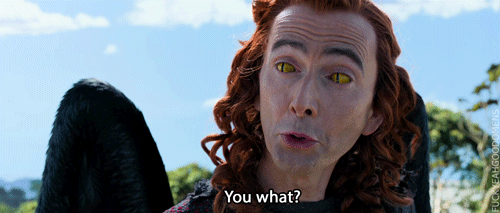
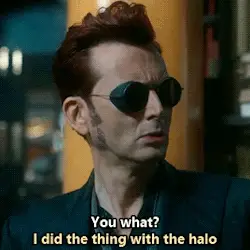
Chronologically, we see the Eyebrows of Disbelief twice before my fave moment in 1601: once (above left) in that scene on the Garden Wall that familiarizes the audience with Crowley's face before adding the dark glasses, when Aziraphale admits he's given away his sword; once when Aziraphale tells Bildad the Shuhite that he, Aziraphale, has Fallen because he lied to the angels to save Job's children.
The Eyebows of Disbelief always signal surprise and amusement with something Aziraphale has said or done. This amusement is sometimes at Aziraphale's expense and sometimes not.
In the gifs above, Crowley is laughing because what Aziraphale has just admitted to doing is fantastic and unexpected and frankly pretty gd punk rock. He's not laughing at Aziraphale, he's laughing because he is delighted with him. The only record we have thus far of Crowley laughing at Aziraphale is this one:
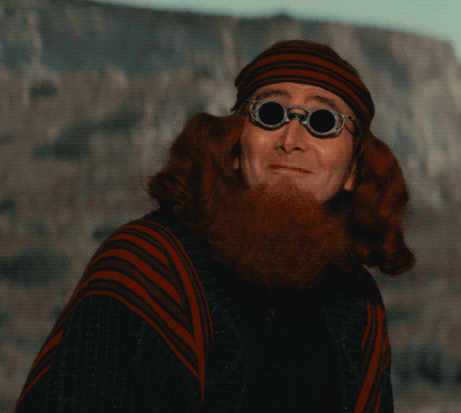
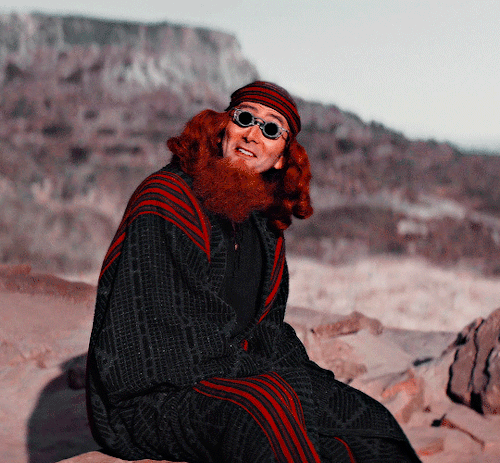
Crowley laughs when Aziraphale informs him--him, a demon who has personally been through the process of Falling--that Aziraphale is Fallen and must be a demon now. As though of the two of them Aziraphale is the expert on how and under what circumstances this occurs.
And yet when Crowley sees Aziraphale's distress--not his fear of being taken to Hell, but his heartbreak and lostness over the fact that his conscience has diverged from God's stated will--Crowley stops laughing, and instead he acts very kindly towards Aziraphale. He validates the gravity of what Aziraphale has done and assures him he won't turn him in. He sits with him so Aziraphale isn't totally alone (like Crowley probably was) as he goes through the loneliest moments of his existence to that point and picks himself up newly weighted with the secret he must now bear.
And after this scene (in canon as it stands thus far), we don't see Crowley laugh at anything Aziraphale says or does again.
And he really has to work for it sometimes. We talk a lot about the things Michael Sheen is able to convey with his face in Good Omens, and absolutely rightly so; David Tennant earns a chunk of his paycheck in this regard as well. If you haven't given yourself the treat yet, rewatch the scene in Will Goldstone's magic shop in 1941 and focus on Crowley's reactions:
youtube
Tennant takes great care to show, with precision, that Crowley is expending effort not to react to Aziraphale's nervous chaos Muppetry and lack of self-awareness. Crowley is self- and socially and contextually aware enough that he knows (better than Aziraphale, at least, which is not a high bar to clear) what's cringe, what's funny, what's ridiculous, how to behave. But whenever Aziraphale crosses a boundary of normalcy, or even sanity, and there is opportunity to laugh at him, Crowley very carefully doesn't react. He doesn't interrupt him, he doesn't try to correct him, he doesn't make fun of him, he doesn't even smirk; he just watches him, as stone-faced as he can manage, no matter how bizarre Aziraphale becomes.
We should be reading this lack of reaction to Aziraphale's social and rational transgressions as powerful positive action. Go watch the Doctor Who episode "Human Nature," or literally any episode of The Inbetweeners, or read or watch Regeneration, and reflect on what it shows you about English masculinity; then consider again the depth of significance in how English- and male-coded character Crowley treats English- and male-coded character Aziraphale in an England created by an English and male-codedpresenting author based off a book written by himself and another male-presenting author. Within its context of English masculinity, Crowley's lack of reaction is not a neutral stance; it is a very fucking loud show of support.
This is not even an inference; it's stated outright in the show. Crowley himself puts it into words 422 years after my favorite moment:
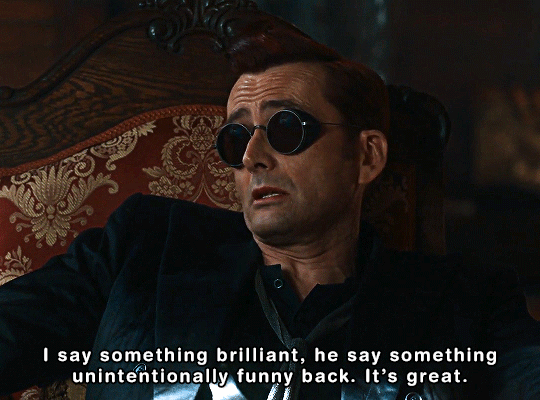
You know how Crowley calls Aziraphale "angel" because the factuality of the descriptor offers him plausible deniability to any Heavenly or Infernal agents who might be listening? Remember how Crowley is a great equivocator? Crowley is equivocating here, too: he's using the cover of what Maggie and Nina will take as a disparaging joke at Aziraphale's expense in order to make a perfectly sincere statement. This is his genuine perception of one of the relationship dynamics he has with Aziraphale and how he feels about that dynamic. Crowley thinks he himself is quite witty (an accurate assessment), Crowley thinks Aziraphale isn't sufficiently self- or contextually aware to hide how strange he is and therefore frequently says and does mad things (also an accurate assessment), and Crowley is Into. That. Shit.
Okay. Now let's look at 1601.
Chronologically it's been almost 1,000 years since we last saw Aziraphale and Crowley. In 537, Aziraphale isn't willing even to consider a labor-saving working arrangement with Crowley of fucking off home out of the damp of Arthurian Wessex; but by 1601, he's worked (and met, and Arranged) with Crowley "dozens of times now," Crowley says, and Azirapahle does not correct him.
In that millienium, Aziraphale has grown to care deeply about Crowley:

In fact he may be somewhat smitten with him:

Seriously, go back and watch Aziraphale here as Crowley approaches and starts speaking to him: he doesn't start smiling until he recognizes that the person speaking to him is Crowley (but he only smiles at Crowley while Crowley's not looking at him).
And Crowley is definitely become smitten with Aziraphale:
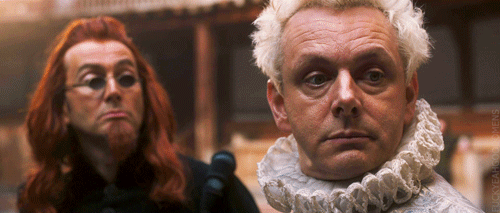
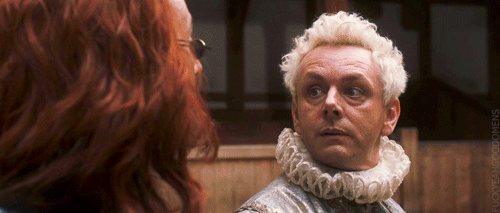
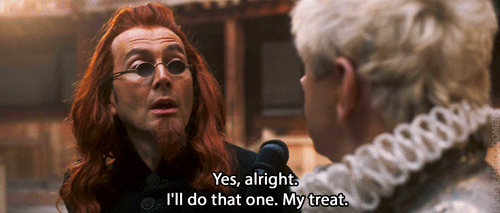
Our man(-shaped entity) is so allergic to work he sets up a meeting to weasel, cajole, or (as it happens) cheat a coin toss to get Aziraphale to do an easy temptation for him in Edinburgh, and then in the same conversation agrees to miracle a play into success because Aziraphale gives him a single hopeful look. Crowley's got it bad.
TL;DR: The Eyebrows of Disbelief happen when Crowley is surprised and amused by something Aziraphale has said or done. Sometimes that amusement is delight with Aziraphale; sometimes it is at Aziraphale's expense. Crowley is aware of this distinction, and when his amusement is at Aziraphale's expense, he suppresses it, even when it takes some effort on his own part, and remains stocially composed. This is equivocation on his part: to Celestial/Infernal operatives lacking knowledge of the intricacies of human behavior, this non-reaction would seem like neutrality; to Aziraphale, who shares with Crowley and the audience the contextual knowledge of English masculinity's utter viciousness, this non-reaction is a profound show of support; and in the safety of support from Crowley, Aziraphale lets his weirdness blossom.
As another meta points out [link if I find it again], we also see in Aziraphale's wordless request about Hamlet and Crowley's immediate understanding of it that by 1601 Aziraphale and Crowley have developed an unspoken, coded method of communication with each other.
Now that we have all of that in mind, here's my favorite moment in Good Omens:
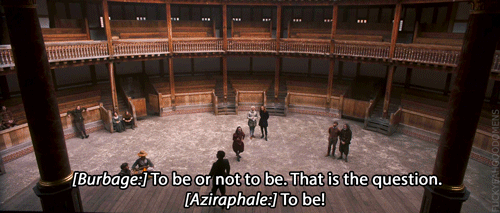
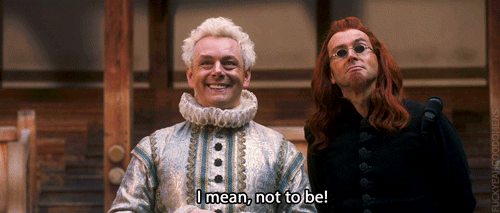
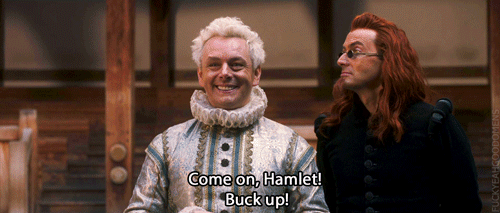
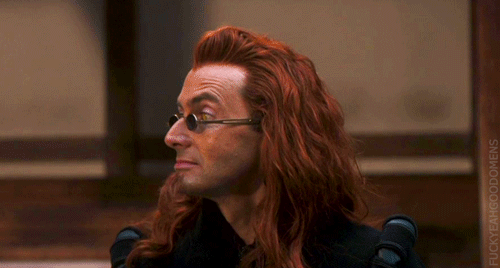
Ixi of Fuck Yeah Good Omens has even kindly archived a closeup of the aftermath, for Crowley, of "Buck up!" In gif 4, above, you can see that the tiny smile is an involuntary reaction that happens as Crowley's eyes widen: for a fraction of a second, he's caught off-guard. In the closeup it's easier to see that he suppresses the smile and gives a tiny shake of his head, Eyebrows of Disbelief heading for his hairline.
There are a number of things Crowley's reaction could mean and what messages it could communicate (we'll get to that in a sec), but regardless, his reaction is, unquestionably, one of surprise and suppressed amusement. This is an aspect of Crowley and Aziraphale's relationship and characters that I like very much, viz., that one of the reasons Crowley likes Aziraphale (though Aziraphale is judgy and occasionally, unintentionally, horrifyingly cruel) is that in addition to being one of the kindest and most courageous beings in existence, Aziraphale is mad as a bag of frogs. Crowley does not know what is going to come out of Aziraphale's lovely mouth next, but Crowley does know there's a good chance he will struggle to believe he's hearing it, and Crowley likes that.
That's what makes this my favorite moment. What makes this moment so cool and rad, though, is its ineffability. We know from the Eyebrows of Disbelief that Crowley is surprised and amused, but any of several things could be read in that almost imperceptible headshake. Like:
What are you doing? or
Why are you like this? or
How can you be aware that you say these things out loud and yet still say them out loud? or
How has my existence come to this? this moment of listening to such insanity?
each of which is a fair and just feeling to have/message to communicate to a man(-shaped entity) who is yelling "Buck up!" at Hamlet.
But that's only if we read Crowley's amusement as being at Aziraphale's expense. And I don't think we should. Because watch Aziraphale here:

He's doing it on purpose. He is shouting a hilariously inappropriate, 100% authentic Aziraphale-brand thing over arguably the gloomiest passage of Shakespeare's famously gloomy play--right after Crowley complains about its gloominess--and he is watching Crowley as he does it. Look at his smile! He knows he's being Deeply Uncool, and he is doing it literally right into Crowley's face.
Remember that we just talked about how by this point in the chronology Crowley and Aziraphale have learned to communicate with each other nonverbally through facial expression? So what does it mean when Aziraphale responds to Crowley's grumbling about Hamlet's gloominess by smiling his minxious Mona Lisa Aziraphale smile, looking right into Crowley's face, and yelling at Hamlet to buck up? Aziraphale, in a carefully coded, carefully Aziraphale way, is joking with Crowley. His silliness in this moment is for Crowley.
So with aaaaaaallllll of this essay in mind, what does it mean that Crowley's reaction to "Come on, Hamlet! Buck up!" is widening eyes, an involuntary twitch of his mouth toward a smile, and then, his eyebrows still showing surprise and amusement, a tiny shake of his head?
Once more, with inferences:


I do propose, y'all, on the basis of this web of evidence I submit for consideration, that what we are seeing here in my favorite moment of Good Omens is the ineffable equivalent of Aziraphale and Crowley sharing a laugh.
Crowley's amusement here isn't at Aziraphale, because Aziraphale is eliciting that amusement consciously and deliberately. Aziraphale, in good spirits and happy to see Crowley, uses his Aziraphaleness to offers Crowley not only an opportunity for amusement, but the opportunity to be in agreement with him about what in this situation is funny. They're on the same side of this joke.
And his humor lands just as he wants it to: Crowley, just for a moment, is caught off-guard, and tickled--
But remember, Crowley is worried in this scene about being surveilled ("I thought you said we'd be inconspicuous here"), and he worries about audio surveillance a lot ("Walls have ears"; "Don't say that. If my lot hear [etc.]," etc.), so he's very limited in what reactions he can show or voice. Aziraphale knows Crowley must be perceived by anyone watching or listening to disapprove of his, Aziraphale's, behavior (just as he must be perceived to disapprove vociferously of Crowley's). Both of them know this.

--so Crowley suppresses the smile almost successfully, and shakes his head at Aziraphale, minutely, to say Stop. What you're doing is working, you're close to making me laugh, and if I show how much you have just delighted me, it will blow our cover of "just an Arrangement."
I offer three final data points in advancing my argument that what we see in my favorite Good Omens moment is Aziraphale successfully attempting to joke with Crowley and Crowley recognizing that overture from Aziraphale and being momentarily surprised into a reaction of genuine delight before pulling his face back under control and indicating to Aziraphale that he must stop:
Datum 1. Nothing going on with Crowley's face in this moment is accidental. We know for sure we're not seeing David Tennant react to Michael Sheen here not only because of literally every other point of Tennant's and Sheen's performances in the show, but because Tennant is wearing opaque contacts and sunglasses under film lighting and therefore cannot be reacting to anything more compelling than a level-10-lift blur because Tennant cannot see shit. Crowley's reaction is a deliberate and careful performance choice on Tennant's part, and it's underscored by director Douglas Mackinnon's choice to film Tennant in 1/2 profile to keep Crowley's eyes visible and face readable to the audience. This reaction is supposed to be there and supposed to be meaningful.
Datum 2. The husbands in 1601 is not the only moment in Good Omens when we may be seeing an angel and a demon communicate the message Stop doing that, it makes us look too familiar between themselves with a little headshake:
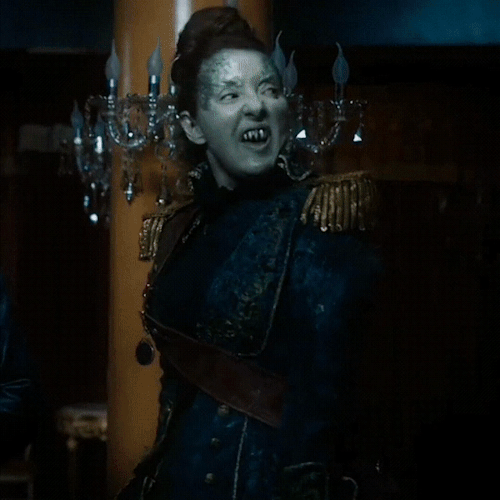
Datum 3: There is another moment in Good Omens when Aziraphale offers Crowley the opportunity to enjoy a joke with him. There, too, his humor lands just as he intends, so we can use this other moment as a comparison to our 1601 moment. I don't have gifs for it, but go back and watch it, S1E6 49:27-42. Snips below.
Aziraphale says something that surprises and amuses Crowley (he asked Hell for a rubber duck while he was sloshing around in the holy water)--
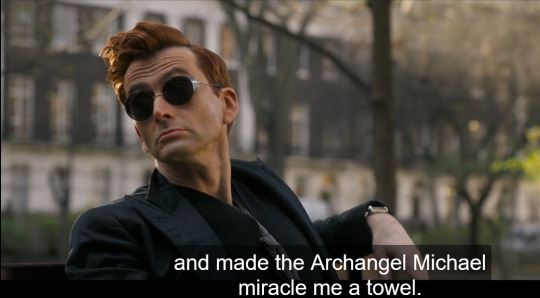
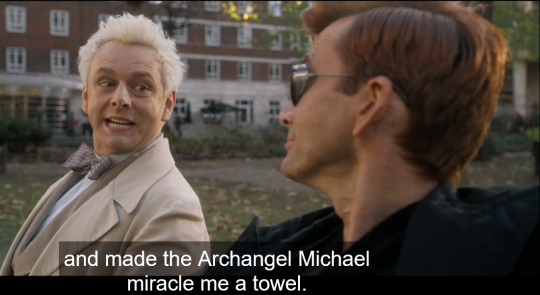
--but what Aziraphale says makes Crowley smile long before it makes him laugh.

In fact, his laugh, though a genuine cackle, is quite delayed, and he laughs only after Aziraphale starts laughing too.
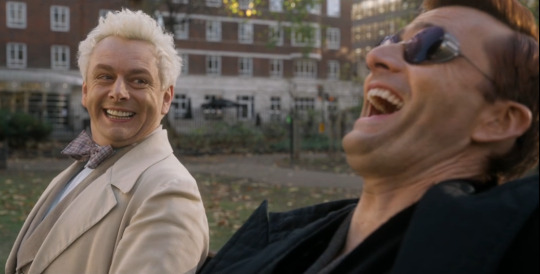
In other words, Crowley's reaction to Aziraphale offering him amusement they're both on the same side of is exactly the same as his reaction to "Come on, Hamlet! Buck up!" right up until he laughs instead of shaking his head. Here, after Armageddidn't, Crowley doesn't have to suppress his reaction, so he can let the smile bloom; he doesn't have to control his response, so, although it takes him a few extra seconds, he lets the smile turn into a laugh.
But in 1601, it's not safe to laugh at Aziraphale's humor. It's not safe even to smile at him. A single piece of evidence or eye/earwitness testimony that he and Crowley have anything more friendly than the most passing and acrimonious of professional relationships could mean death to either or both of them, and depending on what Falling is like, maybe something worse than death for Aziraphale.

But Aziraphale is so funny, so effervescent for Crowley, at Crowley, that it catches Crowley just for a moment. Crowley's eyes widen and the corner of his mouth twitches toward a smile.
And that's dangerous. If Aziraphale keeps acting so charmingly mad, Crowley is going to laugh, and they can't afford that risk, so he shakes his head at Aziraphale. Stop, or I won't be able to keep a straight face around you.

And Aziraphale apparently receives that message, because he immediately eases off. Less than 60 seconds later we learn that he's deeply concerned for Crowley's safety--and that it's not so much that Aziraphale has Crowley wrapped around his little finger as it is that Crowley has wrapped himself around Aziraphale's little finger like a snake arranging itself on the tree branch it calls home.
UPDATE 14/10/23: HOLY SHIT Y'ALL IT GETS EVEN BETTER! THERE IS A SEQUEL!
#good omens#good omens meta#good omens 1601#good omens microexpressions#good omens headshake#angelfish#aziracrow#ineffable husbands#good omens fanalysis
1K notes
·
View notes
Note
I understand that. Michael Sheen is attractive but the more I think about Aziraphale, the more he pisses me off because the worst thing he could have said was turning Crowley back into an angel. Crowley hates heaven and doesn’t wanna be an angel. Why does Aziraphale refuse to admit that both heaven and hell suck and why does he say that Crowley is a bad guy when he isn’t one?
Don’t worry, I didn’t think you were calling Michael Sheen unattractive :))
Ok, a lot to unpack here. But i love thinking about good omens so thank you for asking.
First of all, Aziraphale didn’t say Crowley is a bad guy. Crowley said that they asked him back to hell but he’s “not rejoining their team” and he said no. To that aziraphale replied “obviously you said no to hell, you’re the bad guys”. Not the most diplomatic way to say it, he should have said “they’re the bad guys”, but beneath the words is this: he thinks it’s logical crowley said no because he doesn’t think crowley is a right fit for hell. Because crowley is good.
Does he think crowley is right for heaven, then? Not as is — but perhaps as it could be. They could make it better, together. Crowley would be safe there: no longer hated and hunted by heaven or hell. Under aziraphale’s protection. The metatron made it very clear he knew what him and crowley had been up to for all those years, and there was a veiled threat in that, in my opinion.
Now aziraphale & heaven — it’s complicated. Aziraphale doesn’t like thinking about it. He likes living in blissful ignorance enjoying human delights such as books and theater. The last thing he wants to do is work. And over the past 6,000 years he has learned to see shades of grey but he’s also been unable to make real changes. And overall he considers heaven to be better than hell, still. There’s no real alternative.
His choice at the end of season 2, to me, makes a lot of sense. Let’s put it this way. Let’s say you’ve been working for a big charity for the longest time. There are flaws in the company: not everyone who deserves it, is getting help. The charity is being run really badly.
Then, they offer you a new position. You can run the charity. You can change it, but it’ll be hard and you’ll have to give up your current life. Your best friend says: we should just run off together and be happy together. Could you turn your back on the charity? Knowing you could’ve made a difference — or at least tried? That there are people who need help, that aren’t getting it, because you made a selfish choice?
Aziraphale and crowley both have their own flaws in their reasoning, their own motivations. I don’t think aziraphale is more wrong for choosing heaven than crowley is wrong for wanting to be cut off from everything.
The truth is this: the second coming is being put into motion. Aziraphale and crowley are humanity’s only hope.
Aziraphale thinks he can make a difference by influencing heaven. I don’t think he’s mean, or out of character, for that choice.
I do think he should tell crowley he loves him though.
438 notes
·
View notes